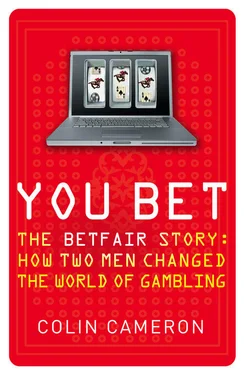Apart from the decade of their births and physical scale – actually Black has even more to fear from ceilings than Wray – the pair would appear to have little of substance in common. Maybe also the card game, bridge. Wray, if not quite as sharply dressed as Gordon Gekko in the movie Wall Street, has the look of a seasoned City man, with well over a decade of high-wire finance to his name. Black’s wardrobe is eclectic. He once collected an entrepreneur’s award at a black tie event in his trainers – candidly acknowledged on his Internet blog – having forgotten to change into the more accepted patented style. Black’s employment record is the antithesis of Wray’s, whose focus and drive carried him up to Vice President rank at financial giants, J.P. Morgan, which he joined straight from university.
The CVs of Black and Wray are perhaps the most striking contrast of all. Black, or Bert, as his best friends know him – reputedly, at King’s College, Wimbledon, a teacher mistakenly referred to him by this name – lists golf caddy, professional bridge player, and a spell at the government spooks and spy centre, Government Communications Headquarters (GCHQ), among his jobs since leaving university. Unlike Wray, he also stacked shelves at B&Q.
Until 1998, the pair, despite significant shared family ties, were at best acquaintances, a state easily explained by the lack of a substantive common denominator between the two. In truth, they only came together meaningfully as a result of a conversation that year. The thirtysomethings were at a garden party of Ed Wray’s brother, Jeremy, a bridge partner of Black’s, which was the principal overlap in the families. On this occasion, Ed Wray – no common nickname, the schoolmasters at Tonbridge being less prone to memory lapses – and Black spoke for perhaps a little longer than normal for two men who knew each other through an extended family network.
There did exist the slenderest of common threads, that of gambling. This probably sustained their social chat into overtime. Wray, who describes himself as an ‘enthusiastic punter’, mentioned to Black that he was disappointed with the amount of money he had won recently betting on a particular horse. Black remarked back that, in the future, on the basis of an idea he had for Internet gambling, he could expect a better return for his money. ‘Tell me more,’ invited Wray, whose brother had previously mentioned that his bridge partner and best friend had been thinking about an idea that might amount to something in the gambling world. So Black, sensing growing serendipity, explained; offer gamblers the chance to bet with each other, directly, via the Internet.
Today, as a consequence of this conversation, both Black and Wray are multimillionaires. Betfair, the company they set up in 2000 now stands proudly on the north bank of the Thames, just down from Hammersmith, home to nearly 1,000 of Betfair’s global workforce of 1,350. The company is worth in excess of £1.5 billion, a valuation based on the sale in 2006 for £355 million of 23 per cent of the company. The valuation since has gone up. What’s more, as a result of this unlikely pair collaborating and colluding, attitudes towards betting, horseracing, sport everywhere, and the stance of governments worldwide, have changed immeasurably.
There is a new global culture of gambling and a growing constituency, worldwide, that bets as a form of leisure. There has also been a corresponding change in government attitudes to betting with a raft of measures deregulating the industry since 2000. A reflection of this is that across Europe, the names of bookmakers – indeed many of them Internet-based – grace the sports shirts of a steadily increasing number of professional clubs in a range of disciplines. In Britain, where betting topped £91.5 billion in 2006 and was estimated to have exceeded £14 billion with William Hill and Ladbrokes alone in 2007, gambling has, from September 2007, been advertised on mainstream TV and radio for the first time. It has never been easier to play roulette, either, through the many websites – including Betfair – offering the game online to casinos themselves.
Betfair has been at the forefront of betting’s transformation from a sleazy, illicit habit into a mainstream pursuit. The Internet is the growing method of betting in countries ranging from Afghanistan to Zambia (just two of the eighty-plus countries in which Betfair boasts clients, using ten different currencies to bet via Betfair.com, available in seventeen different languages). In Britain, nearly one in ten of the population, according to Gambling Commission – a body created in 2005 to regulate the industry – bet regularly in 2007 using remote devices from Internet to mobile phone. But Betfair has done more than simply meet growing demand in a relatively fresh, new market. The world of information has been permanently altered by the emergence of Google, and rival search engines. The website, eBay, has changed the way we buy and sell personal possessions. Because of Amazon we purchase books, CDs, and DVDs differently. And Betfair has changed how many gamble and bet. In simplest terms, an eBay for gamblers, sharing the stock market’s ability to aggregate buyers and sellers, has changed its own world, and in the process ones beyond.
What is revolutionary about Betfair? The website enables gamblers to cut out completely the middleman, otherwise known to those in Britain as the bookmaker, so that effectively gambler deals directly with gambler, via Betfair.com. What Black and Wray developed is a concept handling in 2008, the company claims, five million transactions daily – more than all of Europe’s stock markets combined – that a new breed of worldwide gambler seeks to place round the clock. The significance of this is that Andrew Black and Ed Wray have enfranchised the world’s gamblers. Simply this allows betting on your own terms. What’s more this is betting at high speed, in tune with the pace at which many live their lives in today’s high-tempo world.
By way of illustration, take a football match. During the ninety minutes, Betfair markets constantly fluctuate reflecting the precise state of play at any time – even in which half the ball is. Say that Manchester United are 2-0 down after ten minutes but you still fancy them to come back and win. Someone else logs on to Betfair who believes the opposite and offers you odds against your prediction. You take the odds on offer, then watch your screen as others enter the market offering different assessments with every subsequent throw in, free kick, corner, yellow and red card, save, near miss, and goal. At any stage you can bet again on the same outcome, or offer odds yourself and take – or, as a bookmaker would say, lay – a bet. At the same time, you could bet on what horseracing is taking place. The odds on that are traded as soon as the runners are known, right up to the last few yards of the final furlong. The market fluctuates with every stride until the field is in the shadow of the winning post. Betting-in-running; a different risk altogether.
This is also betting that is much more acceptable, both socially and to governments. The latter are happy to sanction freely consenting adults betting with each other. Eliminated from proceedings is an element that to many represented not only a middleman, but – with apologies to all respectful bookmakers – a pretty unreliable, unsavoury type, with doubtful ethics and a reputation for dishonesty, topped by a pork pie hat. Using Betfair.com, I bet with you, you bet with me. Or I make the odds – again, lay the bet – for you to take, or you make the odds and I bet. An altogether more civilised means of staking – and of course, potentially losing your shirt. Or as Betfair’s marketing campaign of 2008 maintained, betting as it should be.
Читать дальше











